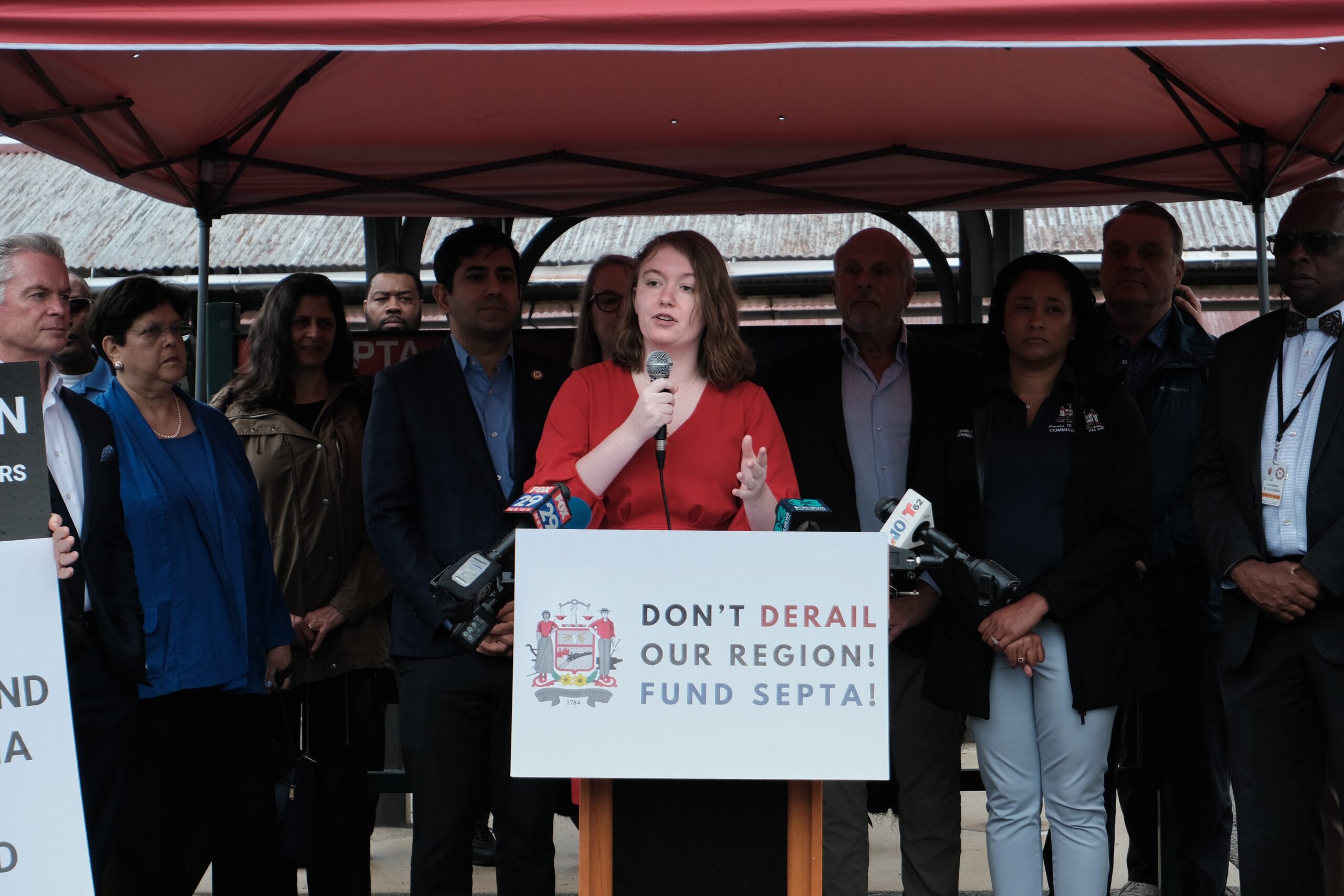As the Paoli-Thorndale line is facing the threat of closure following a slew of proposed SEPTA budget cuts, students of Bryn Mawr and Haverford Colleges gathered to show their support for the transit line. On the morning of May 6, the Montgomery County Commissioner’s Office hosted a press conference inviting local activists, university administrators, and college students to speak in support of keeping SEPTA services running.
In April of this year, SEPTA announced a budget proposal calling for 45% service cuts that would lead to the elimination of several bus and regional rail lines. This would include the Paoli-Thorndale line—the only regional rail line servicing Bryn Mawr and Haverford.
Montgomery County and the general Southeastern Pennsylvania region are known for being home to numerous renowned institutions of higher education. Commissioner Neil Makhija kicked off the conference by pointing out how students in the area are heavily reliant on SEPTA for access to their places of work, internships, classes, and other essential aspects of their education. “Don’t derail these students’ futures,” said Makhija.
Co-commissioner Jamila Winder further highlighted the importance of public transit in ensuring equitable access to education, asserting that the proposed budget cut is not only an economic issue, but also a justice and education issue.

Bryn Mawr College President Wendy Cadge also spoke, offering insight on the extent to which the college’s students and faculty rely on SEPTA. Touching upon the recently introduced UPass program that provides Bryn Mawr students with eight free SEPTA swipes per day, Cadge noted that approximately 1000 Bryn Mawr students use their SEPTA pass each month. “I can safely say that Bryn Mawr College loves SEPTA,” said Cadge.
Tim Harte, Provost and Professor of Russian at Bryn Mawr College, expressed his appreciation for the SEPTA as well, giving credit to the regional rail for facilitating his daily commute and giving him a space to think without having to worry about the stress that comes with driving. He continued, saying, “not only is it environmentally friendly, the SEPTA train is where I’ve gotten my best thinking and writing done over the years… [it’s] good for one’s blood pressure.”
The following speaker was Montgomery County Community College’s President, Victoria Bastecki-Perez. Bastecki-Perez further emphasized the interconnectedness of education and transit, asserting that reliable and affordable transit is essential to ensure that education remains accessible for everyone. She continued by explaining how the proposed fare increase of 21.5% would only create another burden for students who are trying to balance tuition, housing, and other costs of living that are required to continue their education, using this reality to call upon local lawmakers to reinvest in SEPTA in order to maintain equity and justice in the community.
Two students from the Bi-Co spoke at the event; Olivia Loudon, BMC ‘25, and Ellie Baron, HC ‘25. “There’s a stereotype about mainliners,” Loudon said, “that we’re a bunch of yuppies who only take SEPTA because we can’t be bothered to gas up the Lexus.” But, as many of the speakers before touched on, Loudon emphasized that this is not true. She explained that taking away access to work, education, and opportunity is an issue that will affect all Pennsylvanians, no matter where they live. She implored Bi-Co students and members of the local community to reach out to lawmakers and spread the word about the impending budget cuts. “This is not an issue to be solved by just putting out yard signs. It is something that requires calls, emails, letters—it requires us to be so loud that they can hear us all the way in Harrisburg…[so] get calling, get writing, get active, and get moving while we still have the transit system to help us do it,” proclaimed Loudon.

Baron discussed her experiences taking SEPTA, including the Paoli-Thorndale Line and the Norristown High Speed Line, to go to Philly for internships, thesis research, and classes. “Our college and our city would be dysfunctional without public transit,” said Baron. She analyzed how the proposed budget cuts would only exacerbate Philadelphia’s status descent into one of the poorest major cities in the country and further urged lawmakers to fund SEPTA and “act in the interest of college students in the area who are future Philadelphians and future members of the local workforce.”
Eric Hartman, Executive Director of the Haverford College Center for Peace and Global Citizenship, also spoke. “SEPTA is an engineer of job creation ensuring health, safety, and economic growth not only for students but also for workers and community members,” said Hartman, mentioning how SEPTA facilitates walkable cities, tight-knit communities, and social progress.
The event was rounded out by local activist Connor Descheemaker, the statewide campaign manager at Transit For All PA, a statewide coalition of transit riders, transit workers, and transit-supportive organizations and businesses working to expand Pennsylvania’s public transit systems. Descheemaker spoke of the issues that the budget cuts would prompt, including traffic surges, which would, in turn, further damage the already crumbling Pennsylvanian road systems, and the permanent nature of eliminating rail lines. He also touched upon how these cuts would interact with the upcoming FIFA World Cup games that will be hosted by Philadelphia in 2026 and the upcoming 250th anniversary of the United States. He asserted that Pennsylvania must prioritize revitalizing public transit, especially at a time where the region will be seeing massive influxes of people.
SEPTA will be accepting public comment on the matter until May 28 and the SEPTA board will vote on the budget on June 26.
